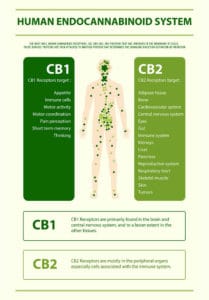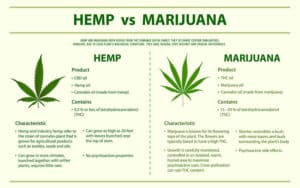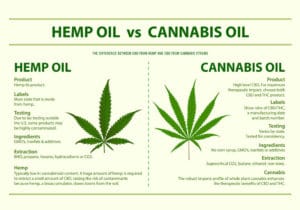How can a plant that helped clean-up Chernobyl’s radiation help reduce inflammation, reduce muscle and joint aches, ease anxiety and depression and nausea?! And furthermore, why is CBD in everything from my coffee, to lotion, to cheese fries? It’s all BS, right?
Well, first thing’s first, some quick glossary terms:
Endocannabinoid System
Discovered in 1992, the Endocannabinoid System functions like our nervous, respiratory, and skeletal systems, scattered throughout our bodies. Identifying two main cannabinoid receptors, CB1 and CB2, reveals their primary expression in the brain and immune system.
Cannabinoid receptors are responsible for regulating the balance of many everyday functions in the human body. Consider CB1 and CB2 receptors as locks, specifically designed to open with a particular key, illustrating their unique roles in the endocannabinoid system.
The default keys are the endocannabinoids – cannabinoids synthesized by the body itself. CBD and THC act as picklocks replicating those and activates the receptor.

Marijuana
Marijuana is a different variety of the Cannabis sativa L. plant and contains high concentrations of tetrahydrocannabinol (THC), the chemical that produces psychoactive effects.
Cannabis
In contrast, hemp by definition contains minimal concentrations of THC. Derived from the Cannabis sativa L. plant (either marijuana or hemp varieties), CBD is a distinct compound with various potential health and general wellness benefits.
THC
The predominant phytochemical in cannabis, THC, induces its psychoactive effects. Interacting with CB1 and CB2 receptors in the endocannabinoid system, THC alters mental status, motor function, memory, and body temperature.
CBD
As the plant’s second most prevalent constituent, CBD is an isolated chemical compound from Cannabis. Unlike THC, CBD doesn’t impact personality but may have calming and relaxing effects.
Will it make me happy?
CBD doesn’t necessarily boost serotonin levels, but it may affect how your brain’s chemical receptors respond to the serotonin that’s already in your system.


What does the Farm Bill have to do with it?
The Hemp Farming Act of 2018 was a proposed law to remove hemp (defined as cannabis with less than 0.3% THC) from Schedule I controlled substances and making it an ordinary agricultural commodity. Its provisions were incorporated in the 2018 United States farm bill that became law on December 20, 2018. Hemp is a fast-growing, easily-cultivated variety of the Cannabis sativa L. plant with many commercial uses, such as textile products and food.
Despite the fact that neither hemp nor hemp-derived CBD contain significant amounts of THC, until December 20, 2018, hemp was categorized as a Schedule I substance under the Controlled Substances Act, the main federal criminal law regarding prohibited drugs, alongside narcotics such as heroin.
Federal legalization means that hemp producers and businesses that deal in hemp and hemp-derived products, such as CBD, are now free to pursue their businesses more aggressively, and with less concern that a seismic shift in enforcement priorities could result in their investigation or prosecution by federal authorities.
According to medical studies CBD can help with:
- Memory
- Appetite
- Energy
- Balance
- Metabolism
- Stress Response
- Immune System
- Female Reproduction
- Nervous System
- Analgesia
- Sleep
- Exercise
- Depression
- Anxiety
- And More
In this podcast episode, I talked to Laura Komkov who founded CBD company Canvas 1839 after seeing it’s incredible effects on her own healing as a “medical unicorn” with multiple, rare, and invisible autoimmune issues. I learned lots in this episode about CBD, including how to to find the dose right for you.
If you’re interested in bringing CBD into your healing regimen, check out Canvas 1839 and get 15% off with code RELIEF15
Now, what are your thoughts? All hype no heart? Let me know!




